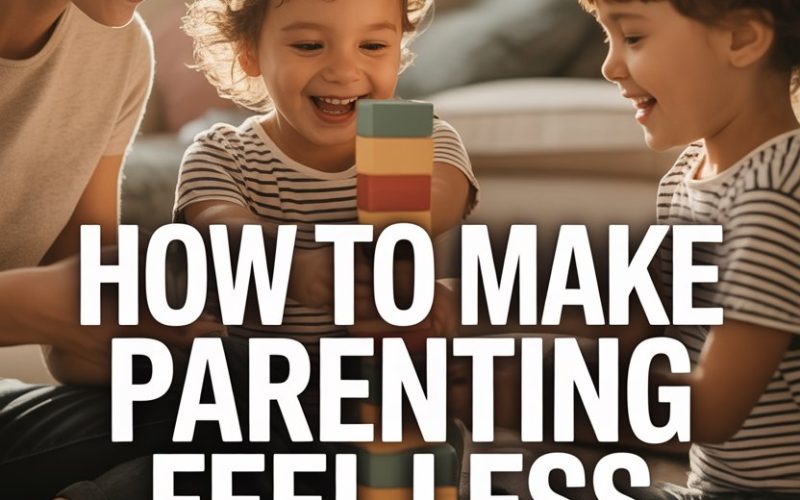Parenting is supposed to be rewarding, but some days it’s just you, a pile of laundry that may or may not be alive, and a three-year-old who’s painted the dog blue.
If you’re reading this, you’re probably craving less exhaustion and more actual fun.
Good news: there are ways to make the daily grind feel a little lighter (and maybe even laugh along the way).
Embrace ‘Good Enough’ Parenting
Perfection is a myth invented by people who never had to pack a lunch at 6 a.m. There’s no need to churn out bento boxes worthy of a food magazine, or run a household worthy of a Scandinavian lifestyle influencer.
The research is clear—children thrive with ‘good enough’ parenting, not perfect parenting.
If your child’s sandwich looks like it’s been through a minor car crash, congratulations, you made lunch. Did you forget the library book (again)? Welcome to the club.
Lowering the bar to “good enough” isn’t slacking—it’s survival with a smile.
Share the Load, Even When It Feels Awkward
Many parents joke about never peeing alone, but still insist on carrying every burden themselves.
Here’s something wild: you don’t have to do it all solo. Kids—even toddlers—can pitch in.
Assign age-appropriate tasks, even if the results are more interpretive than functional. A four-year-old folding laundry might resemble a Monty Python sketch, but it’s one less thing off your plate.
For two-parent households, share the mental as well as the physical load.
The person who always remembers the dentist appointments is working just as hard as the one who unclogs the drain. Researchers call this the “invisible load” of parenting, and it’s real.
Rethink Routines Without Guilt
The parenting world is awash with “shoulds”—you should read three books at bedtime, you should cook organic, you should host Pinterest-worthy birthdays. Let’s retire some of these.
Decide which routines genuinely matter to your family’s happiness, and which ones are just adding stress.
If the idea of home-cooked dinners every night makes you want to cry, keep things simple.
Scrambled eggs for dinner is not just acceptable—it’s a proud tradition in tired households everywhere. Cut corners where you can.
Routines are valuable, but joy matters too.
Find Your Shortcuts and Scripts
Busy parents become masters of the shortcut. Call it efficiency, call it survival—it works.
The slow cooker isn’t cheating, it’s a life hack. Bulk buying snacks means you’ll never be caught out by a surprise hungry child attack.
Keep a few go-to scripts handy for those moments when you’re too tired to think. For example: “Would you like to brush your teeth before or after your story?” (Either way, teeth get brushed. You win.)
Scripts cut down on negotiations and preserve precious brain cells.
Get Ruthless About Sleep—Yours, Not Just Theirs
Sleep is currency, and you are always overdrawn.
While getting kids to settle can feel like an Olympic event, carving out your own rest is just as vital. That means shutting off the scrolling at midnight, trading off with your partner, or even—gasp—napping while the kids watch something educational.
Chronic sleep deprivation is linked to higher stress and poorer health, so guard your sleep like a dragon guards its gold. The laundry won’t care if you’re a zombie, but your family might.
Say No More Often, Even When Everyone Else is Saying Yes
There’s always another bake sale, another invitation, another ‘opportunity’ for enrichment.
Here’s a radical thought: you can say no. You can even say it twice, just for fun.
Protect your family’s downtime the way you’d protect a secret chocolate stash. Saying no helps prevent burnout, and it models healthy boundaries for your children.
If anyone asks why you can’t chair the school fair, just say you’re “fully committed to your current projects.” If your current project is watching TV in your pyjamas, that counts.
Let Go of the Comparison Game
Scrolling through social media can make anyone feel like they’re failing at life. That other parent is growing organic vegetables and making their own curtains.
Meanwhile, you’re pretty sure your child’s dinner tonight was technically a sandwich, even if it didn’t have a top.
Unfollow accounts that make you feel inadequate.
If you must compare, compare down: “At least I remembered to pick up my child today.” Gold medal for you.
Find Micro-Moments of Joy (Or Just Sanity)
No one is claiming that you’ll have hours of ‘me time’ every night, but there are minutes.
Five golden minutes hiding in the pantry with a biscuit. Three minutes in the car before you pick up the kids, listening to your own music. A hot shower that lasts slightly longer than necessary.
These micro-moments matter.
Psychologists say small breaks can reduce stress, and you’ll be a nicer parent for it, too. Don’t save joy for the big holidays—grab it where you can.
Phone a Friend, Even if it’s Just for a Moan
Sometimes you need to vent to someone who won’t judge you for feeding your kid toast three meals in a row. That’s what friends (or siblings, or your neighbour with six kids and a thousand-yard stare) are for.
Making time for adult conversation—even via WhatsApp—reminds you that you’re still a person. Social support is a known buffer against parental stress, so don’t hesitate to reach out.
Tech Can Help, If You Let It
Alexa isn’t just for playing Baby Shark on repeat; she can remind you about show-and-tell, keep your shopping list, even play white noise for a much-needed nap.
Scheduling apps, shared calendars, and even grocery delivery services can take tasks off your mind.
Don’t feel guilty for leaning on technology. Think of it as the modern equivalent of a village elder, only with Wi-Fi and opinions on your musical taste.
Reframe What Exhaustion Means
Being tired doesn’t always mean you’re doing something wrong.
Parenting uses up mental, emotional, and physical energy. Some days, the best you can do is keep everyone alive and mostly clothed.
Instead of wrestling with guilt, try a little self-compassion.
There are seasons of parenting—some harder than others. This one might be tough, but another is coming.
When to Ask for Extra Help
There’s stubborn tired, and then there’s “I can’t keep going like this” tired. If you’re feeling consistently overwhelmed or hope is in short supply, reaching out to a professional is a strong move, not a sign of weakness.
Mental health providers, support groups, and online resources exist for exactly this reason. Postnatal depression and parental burnout are real things, not just punchlines.
If that voice in your head says “you should be coping better,” it’s lying. Sometimes the bravest thing is to ask for actual help.
Small Shifts, Big Difference
Making parenting less exhausting isn’t about grand gestures (unless someone offers you a free holiday, in which case, accept immediately).
It’s found in tiny shifts: lowering unrealistic expectations, saying no to extra stress, reclaiming a few moments for yourself.
Even one change can lighten the load.
And the very best part? You might find yourself enjoying parenting more, even if the dog is still blue.




